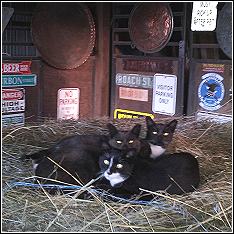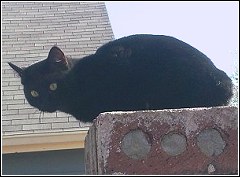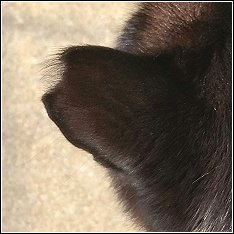Home >
Our Services >
Trap, Neuter & Return (TNR)
Trap, Neuter and Return, also known as TNR for short, is a method of stray and feral cat population control
where nuisance cats (usually an entire colony) are removed via trapping, spayed or neutered, ear tipped and returned to the area from
which they were originally trapped, at which point, an individual
at that location has agreed to provide them with food, water and shelter.
If you have a feral cat colony or need TNR assistance,
please contact us for more details on how we can help one another help these animals.
On This Page
What Is TNR? (Trap, Neuter, Return)
TNR is viewed by many as a humane way to help control feral cat populations.
Basically it involves humanely trapping the cat(s), taking it to a veterinary clinic to be spayed
or neutered and then returning it to the colony from which it came. In many cases, the feline
also receives a health check and vaccinations while at the veterinarian's office.
After recuperation they are returned to their colony habitat where a caring individual
has agreed to provide them with food, water and shelter.
Stabilized Colonies
Once all the cats in a feral colony have been spayed and neutered,
the colony is known as a "stabilized" colony.
A stabilized cat colony is believed to be easier for area residents to co-exist with for several reasons.
For instance, the urine odor produced around the home by unneutered males is reduced,
the yowling and fighting that occur around mating is eliminated, as is the uncontrolled growth of the population.
Proponents of TNR believe that a "stabilized colony" is a better way to control stray cat populations
than simply trapping, killing and removing the colony entirely, not only for humane reasons, but also for reasons
of control as well. This is based on the belief that if a feral cat colony is destroyed, another wild cat
colony will simply move in and take their place. But if a sterilized colony of cats is allowed to exist,
then ideally the stabilized colony will not welcome unsterilized cats to join the fold -
and the overpopulation of stray cats will be kept within manageable limits.
TNB - Trap, Neuter, Barn
TNB is similar to TNR in procedure, however, the cats are returned or relocated to a
location where they will reside within a barn environment.

Ned Bruha's TNB Project
Barn Cats Laying Down On The
Job And Sporting Tipped Ears
Barn Cats Laying Down On The
Job And Sporting Tipped Ears
TNB projects can be very beneficial to rural property
owners looking for a way to control their rodent and snake populations. And the cats in turn are fed and watered, and
have the barn for shelter as needed.
If you need barn cats, call your local animal welfare office or contact us.
Please note that you will need to follow the below relocation guidelines when establishing a cat colony
via Trap, Neuter, And Barn, or your new barn cats will likely wander off never to be seen again.
Relocating Feral Cats
If a TNR situation involves relocating the cat to a new environment it is important to note
that some or most will be wild enough that they will leave if simply relocated and released
at your property. Thereby taking away their chance to be properly cared for, as
well as leaving your property vacant for an unsterilized cat to seize.
But there are some
steps you can take to help avoid losing a relocated TNR cat.
They must be caged for at least 4-6 weeks to get them used to your property smells,
surroundings, sounds, your animals and to trust you enough to know that you will give them food and water.
If they are not kept in an enclosure for that amount of time or if they are treated poorly,
they will not stick around your property, they will just leave. You and everybody else
involved will lose all time and money invested in trying to assist you. Nobody likes to
keep an animal caged up, but, if you do not keep feral cats caged for one month minimum,
typically they will not stay, therefore defeating the purpose.
Consequently there are some
things you will want to consider before participating in a TNR program that involves
bringing in a new cat colony ... do you have an enclosure or outdoor enclosed area
large enough to keep the cat(s) in along with food, water, shelter and a litter box?
Can they jump, dig or climb to escape?

If you have a feral cat colony or need TNR assistance,
please contact us for more details on how we can help one another help these animals
To answer some frequently asked questions about TNR feral cat colonies, please read
"Frequently Asked Questions About TNR," by
Best Friends Animal Society's.
TNR is indeed controversial. To read more on this controversial subject,
please read Best Friends Animal Society's
"Feral Cat Facts vs. Fiction"
as well as "The Vacuum Effect"
by Alley Cat Allies.
Ear Tipping
All sterilized cats have tipped ears. This makes it possible for caretakers to
differentiate between cats that have already been sterilized vs.
the ones that have not been sterilized yet.
We suggest all TNR and TNB cats and cat colonies practice ear tipping.
Note the left ear on the cat in photo. This one of Bruha's
barn cats. You can see where the tip has been removed from its left ear.
This tells animal control and rescues that this cat has been "fixed" and has had it's shots.
His buddies in the above photo have also had their ears tipped.

Cats with tipped ears save time, money, frustration... and lives!
Several years ago Bruha wanted to better understand TNR and barn cats,
so he took in 6 black, rescued feral cats that would have been euthanized
if a home had not been found for them. Bruha purposely sought out black cats
because at a glance he could tell if there were strange cats on the property
and because darker colored animals are less likely to be taken by hawks, owls, coyotes and foxes.
Bruha likes to prove things via his own experiences, so when he is told that wild and
feral stray cats kill a lot of wildlife, he decided to find out for himself. Over the years,
Bruha has seen his cats kill one baby bird and consume countless mice.
Cape Coral, Fort Myers & Pine Island
Sanibel Island, Captiva, Boca Grande and
surrounding areas in Southwest Florida
Mobile Response #: 239-900-6411
1242 SW Pine Island Rd., Suite 310
Cape Coral, Florida 33991-2126
help@totalwildlifecontrol.com
1242 SW Pine Island Rd., Suite 310
Cape Coral, Florida 33991-2126
help@totalwildlifecontrol.com

















